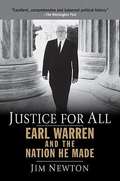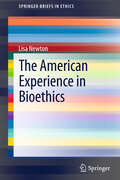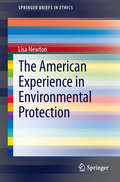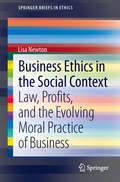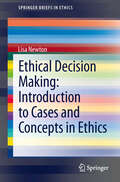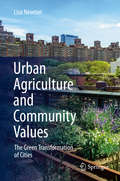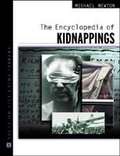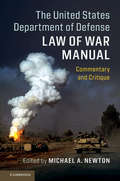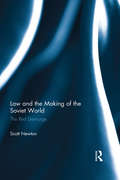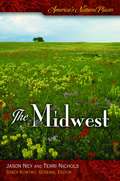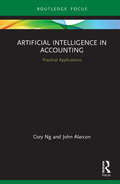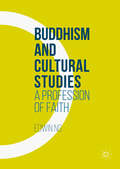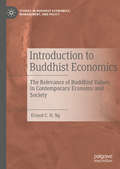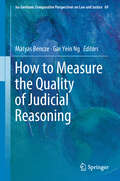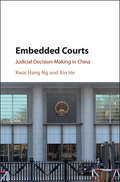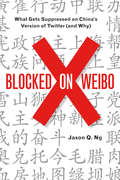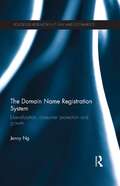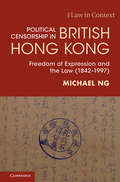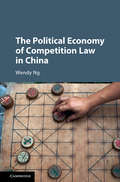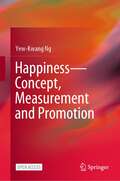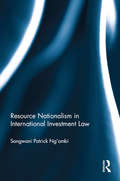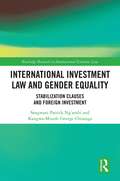- Table View
- List View
Forensic Chemistry
by David E. NewtonForensic Chemistry examines the most important recent developments in this field and their contribution to crime investigation. The book explores the expanding array of instruments, on-site equipment, chemicals, and other means with which evidence is examined, as well as state-of-the-art forensic procedures.
Justice for All: Earl Warren and the Nation He Made
by Jim NewtonIn Justice for All, Jim Newton, an award-winning journalist for the Los Angeles Times, brings readers the first truly comprehensive consideration of Earl Warren, the politician-turned-Chief Justice who refashioned the place of the court in American life through landmark Supreme Court cases whose names have entered the common parlance -- Brown v. Board of Education, Griswold v. Connecticut, Miranda v. Arizona, to name just a few. Drawing on unmatched access to government, academic, and private documents pertaining to Warren's life and career, Newton explores a fascinating angle of U. S. Supreme Court history while illuminating both the public and the private Warren. One of the most acclaimed and best political biographies of its time, Justice for All is a monumental work dedicated to a complicated and principled figure that will become a seminal work of twentieth-century U. S. history. .
The American Experience in Bioethics
by Lisa NewtonThis volume tracks the development in the United States of the field of Bioethics, Ethics applied to the disciplines of medicine, nursing, and health care in general, including medical research and the complex economic and political problems surrounding the provision of medical and nursing care. It explains how the United States developed, case by case, the central rules and principles of ER ethics in the Health Care System. The discussion includes the controversies centering on birth, death, clinical research, experimental procedures (cloning, reproductive technology, organ transplants), and ends with a substantial suggestion on the provision of health care for all.
The American Experience in Environmental Protection
by Lisa NewtonThis book tracks the growth of environmental awareness and conservation in the United States through the major trends of the 20th century, and establishes a philosophical ground for protection of the environment. It records a major cultural shift in the thinking of this nation, and provides guidelines for its continuation.
Business Ethics in the Social Context: Law, Profits, and the Evolving Moral Practice of Business (SpringerBriefs in Ethics)
by Lisa NewtonThe book tracks the rise of Business Ethics as a discipline in the United States through a review of the basic understandings of the role of business practices in the operations of society, beginning with Aristotle and proceeding to a review of the formative concepts and cases in the history of American business.
Ethical Decision Making: Introduction to Cases and Concepts in Ethics
by Lisa NewtonThis short introduction to the discipline of Ethics in its practical and professional applications teaches, in simplest form, the discipline's vocabulary and forms of reasoning. It includes illustrative cases, clear explanations of philosophical terminology, and presents decision procedures appropriate to a hierarchy of cases. It is meant to be a foundation for elementary work in Ethics.
Urban Agriculture and Community Values: The Green Transformation of Cities
by Lisa NewtonThis book addresses the evolving crisis in agriculture and sketches the 'community economy' that grounds agricultural enterprise more accurately than the industrial model. In its current practice, agriculture is (in the United States but increasingly in the rest of the world) unsustainable and destructive. The most immediately unsustainable feature of industrial agriculture is its dependence on the products of petroleum—as feedstock for fertilizers, herbicides, and pesticides, and as fuel for the farm machinery and transport of agricultural products into the cities. The problems of agriculture and in general the food systems to which it is attached range from the vulnerability of monocultures to new and stronger pests to the emerging medical problem of obesity. The need for agricultural reform is widely acknowledged; one part of the new work being done suggests that food production in the cities may solve several of its problems at once. This book is suitable for both undergraduate and graduate students in agriculture and environmental studies.
The Encyclopedia of Kidnappings
by Michael NewtonAn A-to-Z encyclopedia of kidnappings that have taken place throughout history, from Viking raids and Aztec sacrifices to modern-day political kidnappings. Alphabetically arranged by subject, organization, and victims' and kidnappers' names, the volume contains nearly 1,000 entries.
The United States Department of Defense Law of War Manual: Commentary and Critique
by Michael A. NewtonThe United States Department of Defense Law of War Manual: Commentary and Critique provides an irreplaceable resource for any politician, international expert, or military practitioner who wishes to understand the approach taken by the American military in the complex range of modern conflicts. Readers will understand the strengths and weaknesses of US legal and policy pronouncements and the reasons behind the modern American way of war, whether US forces deploy alone or in coalitions. This book provides unprecedented and precise analysis of the US approach to the most pressing problems in modern wars, including controversies surrounding use of human shields, fighting in urban areas, the use of cyberwar and modern weaponry, expanding understanding of human rights, and the rise of ISIS. This group of authors, including academics and military practitioners, provides a wealth of expertise that demystifies overlapping threads of law and policy amidst the world's seemingly intractable conflicts.
Law and the Making of the Soviet World: The Red Demiurge
by Scott NewtonThis book is an unconventional reappraisal of Soviet law: a field that is ripe for re-evaluation, now that it is clear of Cold War cobwebs; and, as this book shows, one that is surprisingly topical and newly compelling. Scott Newton argues here that the Soviet order was a work of law. Drawing on a wide range of sources – including Russian-language Soviet statues and regulations, jurisprudence, legal theory, and English-language ‘legal Kremlinology’ – this book analyses the central significance of law in the design and operation of Soviet economic, political, and social institutions. In arguing that it was an exemplary, rather than aberrant, case of the uses to which law was put in twentieth-century industrialised societies, Law and the Making of the Soviet World: The Red Demiurge provides an insightful account of both the significance of modern law in the Soviet case and the significance of the Soviet case for modern law.
America's Natural Places: The Midwest
by Jason Ney Terri NicholsFrom Iowa's Decorah Ice Cave to the Kitty Todd Nature Preserve in Ohio, this volume provides a snapshot of the most spectacular and important natural places in the Midwestern United States.
Artificial Intelligence in Accounting: Practical Applications (Routledge Focus on Business and Management)
by Cory Ng John AlarconArtificial Intelligence in Accounting: Practical Applications was written with a simple goal: to provide accountants with a foundational understanding of AI and its many business and accounting applications. It is meant to serve as a guide for identifying opportunities to implement AI initiatives to increase productivity and profitability. This book will help you answer questions about what AI is and how it is used in the accounting profession today. Offering practical guidance that you can leverage for your organization, this book provides an overview of essential AI concepts and technologies that accountants should know, such as machine learning, deep learning, and natural language processing. It also describes accounting-specific applications of robotic process automation and text mining. Illustrated with case studies and interviews with representatives from global professional services firms, this concise volume makes a significant contribution to examining the intersection of AI and the accounting profession. This innovative book also explores the challenges and ethical considerations of AI. It will be of great interest to accounting practitioners, researchers, educators, and students.
Artificial Intelligence in Accounting: Practical Applications (ISSN)
by Cory Ng John AlarconArtificial Intelligence in Accounting: Practical Applications was written with a simple goal: to provide accountants with a foundational understanding of AI and its many business and accounting applications. It is meant to serve as a guide for identifying opportunities to implement AI initiatives to increase productivity and profitability. This book will help you answer questions about what AI is and how it is used in the accounting profession today. Offering practical guidance that you can leverage for your organization, this book provides an overview of essential AI concepts and technologies that accountants should know, such as machine learning, deep learning, and natural language processing. It also describes accounting-specific applications of robotic process automation and text mining. Illustrated with case studies and interviews with representatives from global professional services firms, this concise volume makes a significant contribution to examining the intersection of AI and the accounting profession. This innovative book also explores the challenges and ethical considerations of AI. It will be of great interest to accounting practitioners, researchers, educators, and students.
Buddhism and Cultural Studies: A Profession of Faith
by Edwin NgThis book explores the reciprocity between Buddhist, Derridean, and Foucauldian understandings about ethics, subjectivity, and ontological contingency, to investigate the ethical and political potential of insight meditation practice. The book is narrated from the perspective of a postcolonial 'Western Buddhist' convert who, despite growing up in Singapore where Buddhism was a part of his disaporic 'Chinese' ancestral heritage, only embraced Buddhism when he migrated to Australia and discovered Western translations of Buddhist teachings. Through an autoethnography of the author's Buddhist-inspired pursuit of an academic profession, the book develops and professes a non-doctrinal understanding of faith that may be pertinent to 'believers' and 'non-believers' alike, inviting the academic reader in particular to consider the (unacknowledged) role of faith in supporting scholarly practice. Striking a careful balance between critical analysis and self-reflexive inquiry, the book performs in all senses of the word, a profession of faith.
Introduction to Buddhist Economics: The Relevance of Buddhist Values in Contemporary Economy and Society (Studies in Buddhist Economics, Management, and Policy)
by Ernest C. NgLiving in a market-driven economy where short-term profit and economic growth appear to be the ultimate goal, this book explores how Buddhist teachings could bridge the divide between our spiritual and material needs and reconcile the tension between doing good for social interest and doing well for financial success. This book serves as a pioneering effort to systematically introduce Buddhist Economics as an interdisciplinary subject to audience with limited background in either Buddhism or economics. It elaborates some core concepts in Buddhist teachings, their relevance to economics, and means of achieving sustainability for individuals, society and the environment with the cultivation of ethical living and well-being. Through scholarly research from relevant fields including Buddhist studies, economics, behavioral finance, cognitive science, and psychology, this book illustrates the relevance of Buddhist values in the contemporary economy and society, as well as the efficacy of Buddhist perspectives on decision-making in daily life.
How to Measure the Quality of Judicial Reasoning (Ius Gentium: Comparative Perspectives on Law and Justice #69)
by Gar Yein Ng Mátyás BenczeThis edited volume examines the very essence of the function of judges, building upon developments in the quality of justice research throughout Europe. Distinguished authors address a gap in the literature by considering the standards that individual judgments should meet, presenting both academic and practical perspectives. Readers are invited to consider such questions as: What is expected from judicial reasoning? Is there a general concept of good quality with regard to judicial reasoning? Are there any attempts being made to measure the quality of judicial reasoning? The focus here is on judges meeting the highest standards possible in adjudication and how they may be held to account for the way they reason. The contributions examine theoretical questions surrounding the measurement of the quality of judicial reasoning, practices and legal systems across Europe, and judicial reasoning in various international courts. Six legal systems in Europe are featured: England and Wales, Finland, Italy, the Czech Republic, France and Hungary as well as three non-domestic levels of court jurisdictions, including the Court of Justice of the European Union (CJEU). The depth and breadth of subject matter presented in this volume ensure its relevance for many years to come. All those with an interest in benchmarking the quality of judicial reasoning, including judges themselves, academics, students and legal practitioners, can find something of value in this book.
Embedded Courts: Judicial Decision-Making in China
by Ng Kwai Hang Xin HeEmbedded Courts is laden with tension. Chinese courts are organized as a singular and unified system yet grassroots courts in urban and rural regions differ greatly in the way they use the law and are as diverse as the populations they serve. Based on extensive fieldwork and in-depth interviews, this book offers a penetrating discussion of the operation of Chinese courts. It explains how Chinese judges rule and how the law is not the only script they follow - political, administrative, social and economic factors all influence verdicts. This landmark work will revise our understanding of the role of law in China - one that cannot be easily understood through the standard lens of judicial independence and separation of powers. Ng and He make clear the struggle facing frontline judges as they bridge the gap between a rule-based application of law and an instrumentalist view that prioritizes stability maintenance.
Blocked on Weibo
by Jason Q. NgThough often described with foreboding buzzwords such as "The Great Firewall" and the "censorship regime," Internet regulation in China is rarely either obvious or straightforward. This was the inspiration for China specialist Jason Q. Ng to write an innovative computer script that would make it possible to deduce just which terms are suppressed on China's most important social media site, Sina Weibo. The remarkable and groundbreaking result is Blocked on Weibo, which began as a highly praised blog and has been expanded here to list over 150 forbidden keywords, as well as offer possible explanations why the Chinese government would find these terms sensitive.As Ng explains, Weibo (roughly the equivalent of Twitter), with over 500 million registered accounts, censors hundreds of words and phrases, ranging from fairly obvious terms, including "tank" (a reference to the "Tank Man" who stared down the Chinese army in Tiananmen Square) and the names of top government officials (if they can't be found online, they can't be criticized), to deeply obscure references, including "hairy bacon" (a coded insult referring to Mao's embalmed body).With dozens of phrases that could get a Chinese Internet user invited to the local police station "for a cup of tea" (a euphemism for being detained by the authorities), Blocked on Weibo offers an invaluable guide to sensitive topics in modern-day China as well as a fascinating tour of recent Chinese history.
The Domain Name Registration System: Liberalisation, Consumer Protection and Growth (Routledge Research in Information Technology and E-Commerce Law)
by Jenny NgThis book offers a comparative analysis of the domain name registration systems utililsed in Australia and the United Kingdom. Taking an international perspective, the author analyses the global trends and dynamics of the domain name registration systems and explores the advantages and disadvantages of restrictive and less restrictive systems by addressing issues of consumer protection. The book examines the regulatory frameworks in the restrictive and unrestrictive registration systems and considers recent developments in this area. Jenny Ng also examines the legal and economic implications of these regulatory frameworks, drawing upon economic theory, regulatory and systems theory as well as applying rigorous legal analysis. In doing so, this work proposes ways in which such systems could be better designed to reflect the needs of the specific circumstances in individual jurisdictions. The Domain Name Registration System will be of particular interest to academics and students of IT law and e-commerce.
Political Censorship in British Hong Kong: Freedom of Expression and the Law (1842–1997) (Law in Context)
by Michael NgDrawing on archival materials, Michael Ng challenges the widely accepted narrative that freedom of expression in Hong Kong is a legacy of British rule of law. Demonstrating that the media and schools were pervasively censored for much of the colonial period and only liberated at a very late stage of British rule, this book complicates our understanding of how Hong Kong came to be a city that championed free speech by the late 1990s. With extensive use of primary sources, the free press, freedom of speech and judicial independence are all revealed to be products of Britain's China strategy. Ng shows that, from the nineteenth to the twentieth century, Hong Kong's legal history was deeply affected by China's relations with world powers. Demonstrating that Hong Kong's freedoms drifted along waves of change in global politics, this book offers a new perspective on the British legal regime in Hong Kong.
The Political Economy of Competition Law in China
by Wendy NgThe Political Economy of Competition Law in China provides a unique perspective of China's competition law that is situated within its legal, institutional, economic, and political contexts. Adopting a framework that focuses on key stakeholders and the relevant governance and policy environment, and drawing upon stakeholder interviews, case studies, and doctrinal analysis, this book examines China's anti-monopoly law in the context of the political economy from which it emerged and in which it is now enforced. It explains the legal and economic reasoning used by Chinese competition authorities in interpreting and applying the anti-monopoly law, and offers valuable and novel insights into the processes and dynamics of law- and decision-making under that law. This book will interest scholars of competition law and professionals advising clients that operate in China, as well as scholars of Chinese law, Asian law, comparative law, and political and social science.
Happiness—Concept, Measurement and Promotion
by Yew-Kwang NgThis open access book defines happiness intuitively and explores several common conceptual mistakes with regard to happiness. It then moves on to address topical issues including, but not limited to, whether money can buy you happiness, why happiness is ultimately the only thing of intrinsic value, and the various factors important for happiness. It also presents a more reliable and interpersonally comparable method for measuring happiness and discusses twelve factors, from A to L, that are crucial for individual happiness: attitude, balance, confidence, dignity, engagement, family/friends, gratitude, health, ideals, joyfulness, kindness and love. Further, it examines important public policy considerations, taking into account recent advances in economics, the environmental sciences, and happiness studies. Novel issues discussed include: an environmentally responsible happy nation index to supplement GDP, the East Asian happiness gap, a case for stimulating pleasure centres of the brain, and an argument for higher public spending.
Resource Nationalism in International Investment Law
by Sangwani Patrick Ng’ambiForeign direct investment in the natural resource industries is fostered through the signing of concession agreements between the host State and the investor. However, such concessions are susceptible to alteration by the host State, meaning that many investors now require the insertion of stabilization clauses. These are provisions that require the host State to agree that they will not take any administrative or legislative action that would adversely affect the rights of the investor. Arguing that it is necessary to have some form of flexibility in concession agreements while still offering protection of the legitimate expectations of the investor, Resource Nationalism in International Investment Law proposes the insertion of renegotiation clauses in order to foster flexible relationships between the investor and the host State. Such clauses bind the parties to renegotiate the terms of the contract, in good faith, when prevailing circumstances change. However these clauses can also prove problematic for both State and investor due to their rigidity. Using Zambia as a case study, it highlights the limitations of the efficient breach theory to emphasise the need for contractual flexibility.
International Investment Law and Gender Equality: Stabilization Clauses and Foreign Investment (Routledge Research in International Economic Law)
by Sangwani Patrick Ng’ambi Kangwa-Musole George ChisangaThis book analyses the impact that stabilization clauses have on the development of human rights and gender laws in resource rich nations.Given the fact that stabilization clauses freeze the law for as long as the contract subsists there has been debate on the negative impact stabilization clauses have on the progressive development of human rights in the host State. Firstly, the book examines the mechanisms investors utilise in protecting themselves from host State prerogatives. It then explores the theoretical basis on which stabilization clauses are applied and upheld by arbitral tribunals, and assesses how they can be drafted in a way that protects human rights, particularly in relation to gender discrimination, without forcing the resource rich nations to lose momentum in attracting foreign direct investment. Using Zambia and the Gender Equity and Equality Act of 2015 as a case study, the book explores the compatibility of the legislation with the stabilization clauses contained in the country’s Development Agreements.The book will be of interest to practitioners, scholars and students of international investment law, human rights law and contract law.
Unmasked: Inside Antifa's Radical Plan to Destroy Democracy
by Andy NgoA journalist who's been attacked by Antifa writes a deeply researched and reported account of the group's history and tactics. When Andy Ngo was attacked in the streets by Antifa in the summer of 2019, most people assumed it was an isolated incident. But those who'd been following Ngo's reporting in outlets like the New York Post and Quillette knew that the attack was only the latest in a long line of crimes perpetrated by Antifa. In Unmasked, Andy Ngo tells the story of this violent extremist movement from the very beginning. He includes interviews with former followers of the group, people who've been attacked by them, and incorporates stories from his own life. This book contains a trove of documents obtained by the author, published for the first time ever. <P><P><b>A New York Times Bestseller</b>

